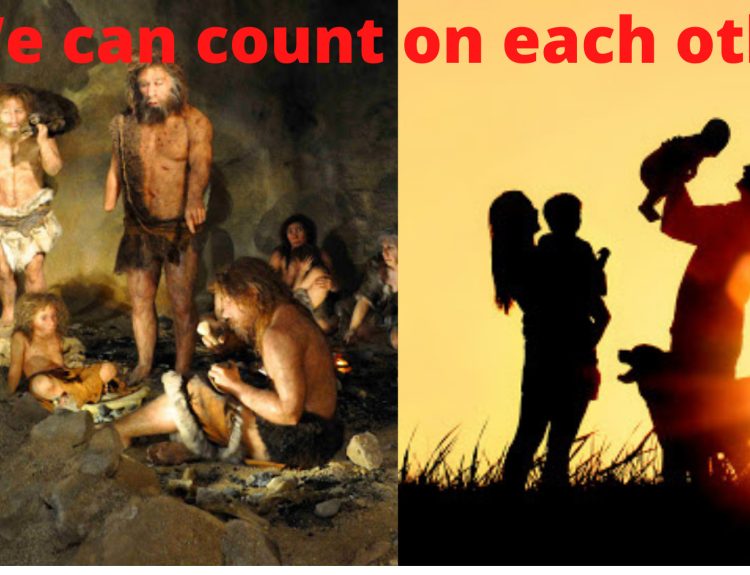Here we are going to discuss Economic anthropology in the context of primitive societies. The word economics is derived from the Greek word ‘oikonomia’ which means management of the household. Despite being the subject of economy, in Anthropology we also study the economic activities of human beings but there are some fundamental differences between the two which are as follows-
- Economics studies modern societies but Economic anthropology studies traditional societies.
- Economics only studies the economic side of man whereas Economic Anthropology studies economics together with other aspects of man.
- Economics is based on demand and supply whereas Economic Anthropology is away from these rules.
- The method of study in economics is often a survey method and questionnaire whereas the method of economic anthropology is fieldwork.
Read more- Relation of anthropology with other disciplines
Human beings have many economic needs like getting food, housing and clothes. For the fulfilment of these needs, the activities that human beings do are called economic activities. In Economic Anthropology, we study these economic activities.
The relationship between humans to humans is called social organization, in the same way, the relationship between the economic things present in nature and the attainment of them by humans is called economic organization.
According to D.N. Majumdar, “the meaning of economic organization is to organize human relations and efforts in such a way that the maximum needs of everyday life can be met with minimum efforts”. Economic organization is the fulfilment of maximum needs with limited resources.
Features of Primitive Economy
- A Primitive economy is a subsistence economy. That’s why their economy is also called a Marginal economy.
- The technology is simple
- The economy is very small
- There is a lack of economic surplus
- Cooperative and collective enterprise
- Lack of profit system
- Absence of a money system
- Presence of Barter and exchange system
- Their economy is almost stable and thriving and does not change quickly
- There is no regular market system
- Lack of specific marketing
- Most of the economic activities are focused on consumer goods
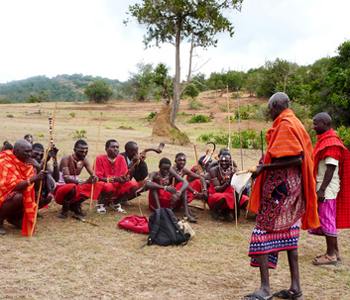
Economic Typology of the Tribal
This is especially in the context of Indian tribes.
- Food gathering and Hunting tribes like Birhor, Kharia, Chenchu etc.
- Other types of tribes who do agriculture like Munda, Santhal, Oraon, Khasi etc.
- Shifting cultivars like Baiga, Gond, Naga etc.
- Handcrafters like Korwa, Agaria etc.
- Tribes that do Animal husbandry like Toda, Bhotiya etc.
- Industrial workers like Santhal, Gond etc.
Traditional Exchange system
According to Karl Polanyi, there are 3 modes of exchange in simple societies. These are reciprocity, redistribution and market exchange. This mode of exchange system can differ from society to society.
Reciprocity
According to Marshall Sahlins, there are 3 kinds of reciprocity-
- Generalized reciprocity- In this, a person gives a gift to another person and does not expect to get the gift back from that person immediately. Later, the second person can give a gift of any value to the first person at any time, the gift must be received in exchange for the gift. Examples- Munda, Gond.
- Balanced reciprocity- In this, one person gives a gift to another and another person gives a gift of the same quantity and value as the first one, it is a type of barter. Example Kula ring or kula exchange.
Kula exchange is a ceremonial exchange. It is mentioned by B. Malinowski. This type of practice is found in the Trobriand and its surrounding Islands. The inhabitants of one island take red shell necklaces (known as Soulva) with them to another island in a clockwise direction, they give red shell necklaces to the people there and in return, they receive white shell armbands (known as Mwali) from them. After that, they go to the next island in a clockwise direction and repeat the same action. Repeating the same action they come back to their island. After returning they gather a lot of Mwali with them. Thus necklaces travel in a clockwise direction and armbands travel in an anticlockwise direction.
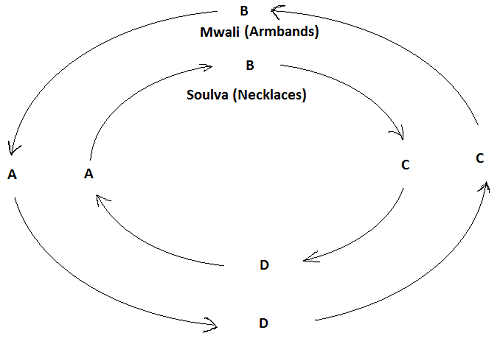
- Negative reciprocity- Here, one person gives a gift to another and the other never gives it back.
Redistribution
In this, the people of the lower level deposit their entire output with a central authority and later the central authority mixes everything and distributes it again among the people. The central authority may be the chief, king, religious leader or the state. Example- Potlatch system.
Potlatch is a kind of ceremonial exchange practised among the Kwakiutl Indians of the Northwest Coast of North America. It is practised among other groups too. It is a kind of food and gift given to a large extent from one kinship group to another. It was held on the occasion of births, deaths, weddings etc. This affirms the social status of the host. This system is highly competitive. It is a kind of showoff of the wealth of the host.
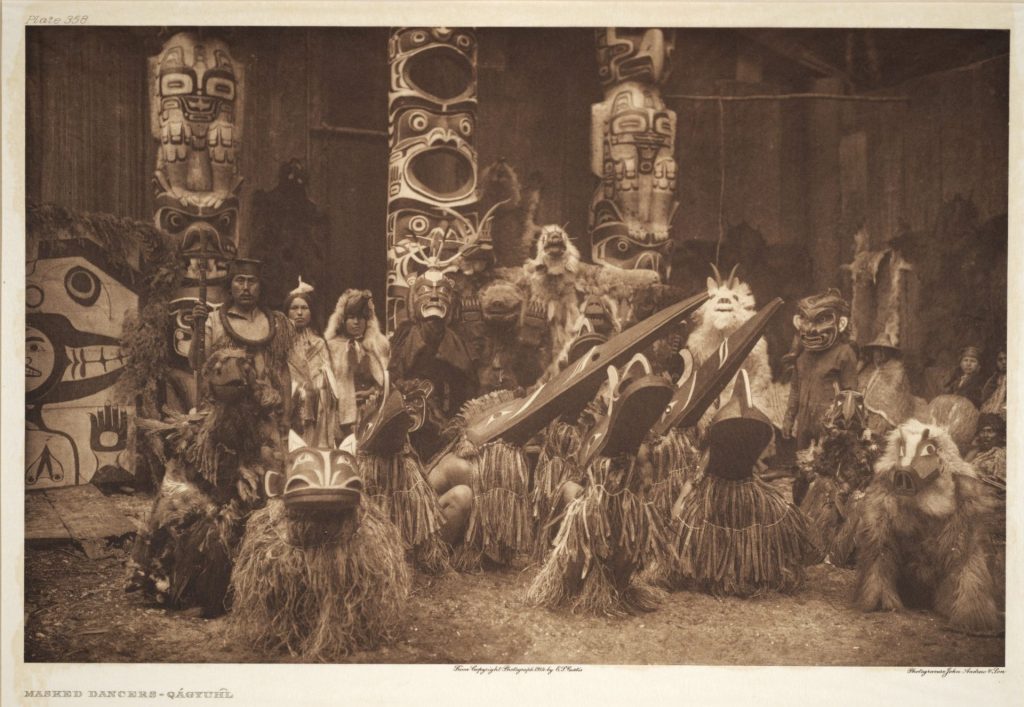
Market exchange
Market-based exchange is found in primitive societies but here only a very simple and early form of currency system is found. In some African tribes, iron acts as a currency while among the Andaman tribes, coconut acts as a currency.
Trade
A very simple way of trade is found in a primitive society. There is no specific purpose here to make a profit. Trade in primitive societies are of two types-
Barter
Market-based buying and selling
Barter
This means getting one thing in exchange for another. This type of system is found more in simple societies.
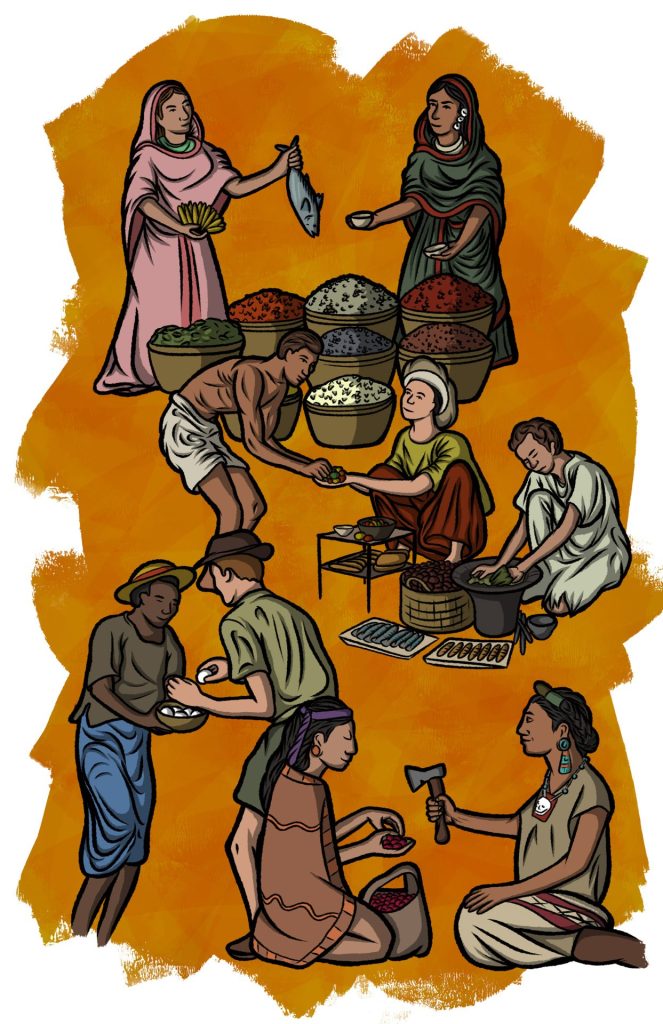
It is of three types-
- Face-to-face barter– Two individuals or groups exchange their commodities in face-to-face interaction.
- Silent barter– This is also known as Dumb barter. Here one group leave their commodities at a specific location and expects the other group to take that silently and then leave their goods for the first group. Example- among the chuckchese of Siberia and Alaskans.
- Money barter- In this, something is given in exchange for a commodity which is valid in the form of money. Example- rice money among the Ifugao of the Philippines.
Market-based buying and selling
Primitive people take the help of the market for their purchases but these markets are simple. These markets can be organized daily, weekly or monthly. Even in this market, the form of business is not found which is found in modern markets. The motive of profit is not much here.
References
Economic Anthropology: The Three Forms of Economic Exchange
Types of Exchange in Economic Anthropology







